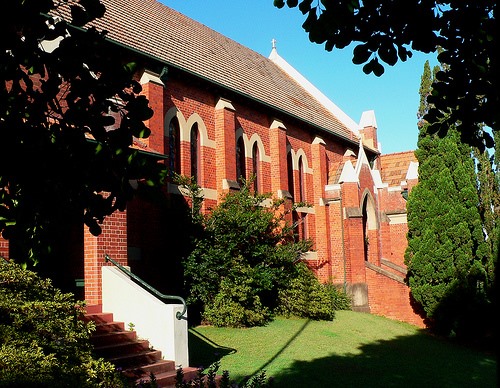

6
MEMORIES OF THE EARLY DAYS OF ST AUGUSTINE’S
When my people moved from the parish
of Esk, there was no rectory, so a
house, in a street, at the top of a hill, off
Crescent Road, was rented for them. The
place was called Finvola, I believe, and
being on the side of the steep hill, some
rooms were on street level with, at least,
the dining room and kitchen below. There
was, of course, a very fine view but, most
clearly, I remember that the toilet was
about three flights of steep garden steps
down the hill. This was a sore trial to
my family but it must have been even
more of a trial to those who had the
misfortune to have to service it. There
were probably more houses in the street
with the same arrangements though I’m
sure none could have been worse. I know
that the convenience of a septic systemwas
not the least of the boons enjoyed when
my people were able to move to the new
rectory.
It was whilst the family were at Finvola
that my younger brother, Llewellyn,
died. He was only twelve. He contracted
tetanus from a scratch on his foot but
it wasn’t until he was past help that
this was recognised. People were
wonderfully kind but I remember
particularly Mrs I.T. Isles and Mr Dick
Clarke. Mr Clarke met me at Central
when I came down from the country and
offered to lend me his car to take my
mother to visit my dying brother. How-
ever, I didn’t feel experienced enough
to drive in the city, even at night. But
not many men would have been gener-
ous enough to offer to lend a car to an
eighteen year old boy they’d just met.
Mrs Isles sent her car (and chauffeur) to
take us to the burial service at Toowong
though the car had been at my mother’s
call at any time she wanted it prior to
then. Bishop Le Fanu took the service and
on the way home I heard him telling my
father that they had, very recently, nearly
had a tragedy in their family also. He
was living at the Deanery and a small
daughter had fallen, head first, over the
upper balcony railing but had fallen into
a shrub instead of directly to the ground.
The three windows at the east end of
the church were intended to be filled
with stained glass and, some time
after the completion of the church this
project was put in hand. After general
design had been agreed upon, a firm by
the name of Credginton, in Melbourne,
submitted coloured drawings and a
price. I don’t know if other quotations
were obtained, but I expect they were.
However, it was decided to get the
windows through Credgintons and the
designs were displayed in the church
porch for some weeks. The vital factor
was, however, that the windows were to
be made in Germany and the name and
location of the makers were shown on the
design.
It never occurred to anyone to emphasise
this fact but, on the other hand, no attempt
was made to hide it. Why the windows
had to some from Germany I don’t
know but imagine that quality and price
were major considerations. That it was a
Christian gesture towards a former enemy
must have weighed also.
Memories of the early days
of St Augustine’s
by Mr Owen Armstrong
(son of The Rev’d John Brodie Armstrong – first Rector of the Parish)



















